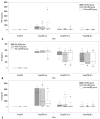Effect of 6% hydroxyethyl starch 130/0.4 as a priming solution on coagulation and inflammation following complex heart surgery
- PMID: 24719128
- PMCID: PMC3990094
- DOI: 10.3349/ymj.2014.55.3.625
Effect of 6% hydroxyethyl starch 130/0.4 as a priming solution on coagulation and inflammation following complex heart surgery
Erratum in
-
Erratum to "Effect of 6% Hydroxyethyl Starch 130/0.4 as a Priming Solution on Coagulation and Inflammation Following Complex Heart Surgery" by Cho JE, et al. (Yonsei Med J 2014;55:625-34.).Yonsei Med J. 2014 Nov 1;55(6):1750. doi: 10.3349/ymj.2014.55.6.1750. Yonsei Med J. 2014. PMID: 25490912 Free PMC article.
Abstract
Purpose: Prolonged duration of cardiopulmonary bypass aggravates the degree of inflammation and coagulopathy. We investigated the influence of 6% hydroxyethyl starch (HES) 130/0.4 on coagulation and inflammation compared with albumin when used for both cardiopulmonary bypass priming and perioperative fluid therapy in patients undergoing complex valvular heart surgery.
Materials and methods: Fifty four patients were randomly allocated into albumin-HES, albumin-nonHES, and HES-HES groups. The cardiopulmonary bypass circuit was primed with 5% albumin in the albumin-HES and albumin-nonHES group, and with HES in the HES-HES group. As perioperative fluid, only plasmalyte was used in the albumin-nonHES group whereas HES was used up to 20 mL/kg in the albumin-HES and albumin-HES group. Serial assessments of coagulation profiles using the rotational thromboelastometry and inflammatory markers (tissue necrosis factor-α, interleukin-6, and interleukin-8) were performed.
Results: Patients' characteristics and the duration of cardiopulmonary bypass (albumin-HES; 137±34 min, HES-HES; 136±47 min, albumin-nonHES; 132±39 min) were all similar among the groups. Postoperative coagulation profiles demonstrated sporadic increases in clot formation time and coagulation time, without any differences in the actual amount of perioperative bleeding and transfusion requirements among the groups. Also, inflammatory markers showed significant activation after cardiopulmonary bypass without any differences among the groups.
Conclusion: Even in the presence of prolonged duration of cardiopulmonary bypass, HES seemed to yield similar influence on the ensuing coagulopathy and inflammatory response when used for priming and perioperative fluid therapy following complex valvular heart surgery compared with conventional fluid regimen including albumin and plasmalyte.
Keywords: Blood coagulation; cardiac surgical procedures; cardiopulmonary bypass; inflammation.
Conflict of interest statement
The authors have no financial conflicts of interest.
Figures

Similar articles
-
Cardiopulmonary bypass priming using a high dose of a balanced hydroxyethyl starch versus an albumin-based priming strategy.Anesth Analg. 2009 Dec;109(6):1752-62. doi: 10.1213/ANE.0b013e3181b5a24b. Anesth Analg. 2009. Retraction in: Anesth Analg. 2010 Dec;111(6):1567. doi: 10.1213/ANE.0b013e3182040b99. PMID: 19923501 Retracted. Clinical Trial.
-
Is the use of hydroxyethyl starch as priming solution during cardiac surgery advisable? A randomized, single-center trial.Perfusion. 2018 Sep;33(6):483-489. doi: 10.1177/0267659117746235. Epub 2017 Dec 4. Perfusion. 2018. PMID: 29199540 Clinical Trial.
-
Effect of 6% Hydroxyethyl Starch 130/0.4 on Inflammatory Response and Pulmonary Function in Patients Having Cardiac Surgery: A Randomized Clinical Trial.Anesth Analg. 2021 Oct 1;133(4):906-914. doi: 10.1213/ANE.0000000000005664. Anesth Analg. 2021. PMID: 34406128 Clinical Trial.
-
RETRACTED: Volume therapy in cardiac surgery: are Americans different from Europeans?J Cardiothorac Vasc Anesth. 2006 Feb;20(1):98-105. doi: 10.1053/j.jvca.2005.07.023. J Cardiothorac Vasc Anesth. 2006. PMID: 16458227 Review. No abstract available.
-
Human albumin and 6% hydroxyethyl starches (130/0.4) in cardiac surgery: a meta-analysis revisited.BMC Surg. 2022 Apr 12;22(1):140. doi: 10.1186/s12893-022-01588-x. BMC Surg. 2022. PMID: 35410195 Free PMC article. Review.
Cited by
-
The effects of hydroxyethyl starch and gelatine on pulmonary cytokine production and oedema formation.Sci Rep. 2018 Mar 23;8(1):5123. doi: 10.1038/s41598-018-23513-0. Sci Rep. 2018. PMID: 29572534 Free PMC article.
-
Mechanical blood trauma in assisted circulation: sublethal RBC damage preceding hemolysis.Int J Artif Organs. 2016 Jun 15;39(4):150-9. doi: 10.5301/ijao.5000478. Epub 2016 Mar 30. Int J Artif Organs. 2016. PMID: 27034320 Free PMC article. Review.
-
Effects of albumin and crystalloid priming strategies on red blood cell transfusions in on-pump cardiac surgery: a network meta-analysis.BMC Anesthesiol. 2024 Jan 16;24(1):26. doi: 10.1186/s12871-024-02414-y. BMC Anesthesiol. 2024. PMID: 38229019 Free PMC article.
-
The comparison of albumin and 6% hydroxyethyl starches (130/0.4) in cardiac surgery: a meta-analysis of randomized controlled clinical trials.BMC Surg. 2021 Sep 11;21(1):342. doi: 10.1186/s12893-021-01340-x. BMC Surg. 2021. PMID: 34511097 Free PMC article.
-
Effects of hydroxyethyl starch 130/0.4 on the kidney tissue of rats with ureteral obstruction.Drug Des Devel Ther. 2018 Sep 20;12:3061-3070. doi: 10.2147/DDDT.S165695. eCollection 2018. Drug Des Devel Ther. 2018. PMID: 30275683 Free PMC article.
References
-
- Niemi TT, Kuitunen AH. Hydroxyethyl starch impairs in vitro coagulation. Acta Anaesthesiol Scand. 1998;42:1104–1109. - PubMed
-
- McCammon AT, Wright JP, Figueroa M, Nielsen VG. Hemodilution with albumin, but not Hextend, results in hypercoagulability as assessed by Thrombelastography in rabbits: role of heparin-dependent serpins and factor VIII complex. Anesth Analg. 2002;95:844–850. - PubMed
-
- Wilkes MM, Navickis RJ, Sibbald WJ. Albumin versus hydroxyethyl starch in cardiopulmonary bypass surgery: a meta-analysis of postoperative bleeding. Ann Thorac Surg. 2001;72:527–533. - PubMed
-
- Haynes GR, Navickis RJ, Wilkes MM. Albumin administration--what is the evidence of clinical benefit? A systematic review of randomized controlled trials. Eur J Anaesthesiol. 2003;20:771–793. - PubMed
-
- Rhee P, Wang D, Ruff P, Austin B, DeBraux S, Wolcott K, et al. Human neutrophil activation and increased adhesion by various resuscitation fluids. Crit Care Med. 2000;28:74–78. - PubMed
Publication types
MeSH terms
Substances
LinkOut - more resources
Full Text Sources
Other Literature Sources
Medical
Research Materials

